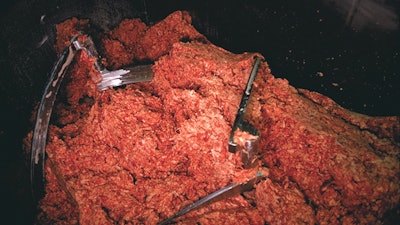
SIOUX FALLS, S.D. (AP) — ABC anchor Diane Sawyer, correspondent Jim Avila and the network are asking a South Dakota judge to dismiss a $1.2 billion defamation lawsuit over the network's reports on a meat producer's lean, finely textured beef product, which critics dubbed "pink slime."
Court documents filed this week provide detailed accounts from Sawyer, Avila and others about how they gathered the information for the reports on Beef Products Inc. and also defend their work, arguing it was done in the public's interest as consumers were unaware that the product at the time was present in 70 percent of the ground beef sold in supermarkets.
To make lean, finely textured beef, the trimmings left after a cow is butchered are heated, the meat is separated from fat and ammonia gas is applied to kill bacteria. BPI's lawsuit, filed in 2012, claims ABC's multiple reports misled consumers into believing that the product was unsafe and led to the closure of three plants and roughly 700 layoffs. The network, Sawyer and Avila — the only three remaining defendants in the civil case — deny that claim.
The case is currently slated to go to trial in June. BPI could be awarded as much as $1.2 billion.
In affidavits filed Monday in support of motions seeking summary judgment, Sawyer and Avila argue that the number of reports was driven largely by questions from viewers, as well as decisions by the government, supermarket chains and BPI. Their argument counters the lawsuit's characterization of the network's coverage as "a monthlong vicious, concerted disinformation campaign against BPI."
ABC's attorneys have argued that in each of its broadcasts, the network stated that the U.S. Department of Agriculture deemed the product safe to eat. They've said BPI might not like the phrase "pink slime," but like all ground beef, it's pink and has a slimy texture.
"My sole interest was to help the consumer by providing information to our viewers," Sawyer states in an affidavit. "I thought that our reporting might result in consumers getting more information from their grocers or might result in some form of labeling that would facilitate consumer choice. I was surprised when supermarket chains decided to discontinue use of BPI's product altogether."
After the reports aired, some grocery store chains announced that they would stop carrying ground beef that contained the lean, finely textured beef, and the USDA began offering school districts that received food through the government's school lunch program choices in ground beef purchases.
In August, the judge hearing the case signed off on the dismissal of five defendants: ABC's news division; correspondent David Kerley; USDA microbiologist Gerald Zirnstein, who named the product "pink slime;" former federal food scientist Carl Custer; and Kit Foshee, a former BPI quality assurance manager who was interviewed by ABC.




















